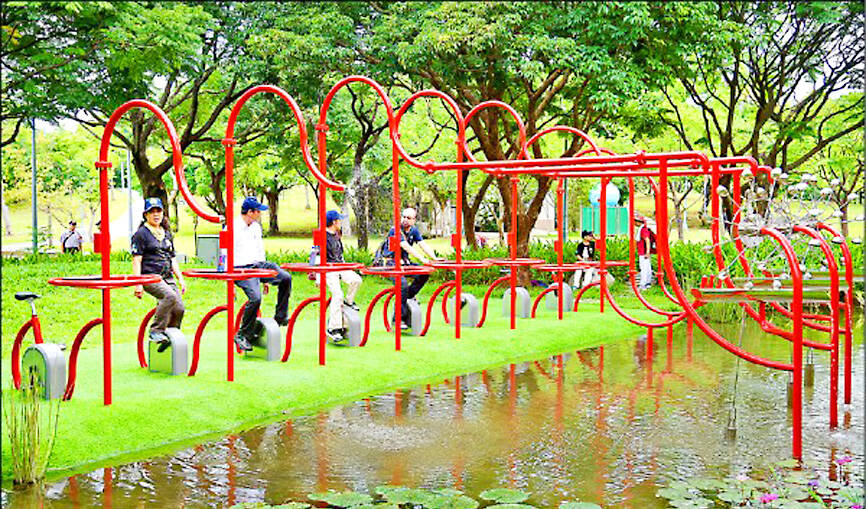Settlements with more green spaces have a lower rate of bipolar disorder, a Taiwanese research team found.
The researchers of the study shared the results yesterday at a press conference held by the Science Media Center Taiwan.
The research team, using satellite remote sensing, machine learning and data analysis, found a significant negative association between green space and bipolar disorder in Taiwan.

Photo: Yang Yuan-ting, Taipei Times
This is the first study in Taiwan using such research methods to measure the influence of green space on bipolar disorder, said the study’s corresponding author Wu Chih-da (吳治達), an associate professor in National Cheng Kung University’s Department of Geomatics.
The higher the ratio of green spaces in a township, the lower the incidence rate of bipolar disorder, the study found.
Taiwan’s current green space ratio shortens the average life expectancy by 6.1 years, it found.
According to the guidelines of the WHO, urban residents should be able to access a public green space of at least 0.5 hectares within 300m of their homes.
Based on the guidelines, 25.6 percent of each administrative district in Taiwan should be allocated to green spaces, Wu said.
Analyzing the satellite remote sensing data from 2013 to 2014, the team found that 50 townships nationwide failed to meet the WHO standards, he said.
If the amount of green spaces in these townships increases to meet the WHO standards, people can have longer life expectancy and increase their income by about 10 percent, he said.
The result showed the correlation between green spaces and bipolar disorder, which does not mean there is a causal link, he said.
Lee Hsiao-yun (李曉昀), a team member and an assistant professor at National Taipei University of Nursing and Health Sciences’ Department of Leisure Industry and Health Promotion, said that green space is not the only factor related to the diseases, but it is one that can be controlled.
Li Cheng-ta (李正達), a division chief of the psychiatry department at Taipei Veterans General Hospital, said that the study results do not directly reflect the mental status of each individual as a result of the amount of green space.
Every case of bipolar disorder is different in symptoms and causes, he said, adding that future studies can look into whether actual exposure to green spaces significantly affects mental disorders.
The study was published in the latest issue of the journal Health and Place.

Taipei has once again made it to the top 100 in Oxford Economics’ Global Cities Index 2025 report, moving up five places from last year to 60. The annual index, which was published last month, evaluated 1,000 of the most populated metropolises based on five indices — economics, human capital, quality of life, environment and governance. New York maintained its top spot this year, placing first in the economics index thanks to the strength of its vibrant financial industry and economic stability. Taipei ranked 263rd in economics, 44th in human capital, 15th in quality of life, 284th for environment and 75th in governance,

The Sports Administration yesterday demanded an apology from the national table tennis association for barring 17-year-old Yeh Yi-tian (葉伊恬) from competing in the upcoming World Table Tennis (WTT) United States Smash tournament in Las Vegas this July. The sports agency said in a statement that the Chinese Taipei Table Tennis Association (CTTTA) must explain to the public why it withdrew Yeh from the WTT tournament in Las Vegas. The sports agency said it contacted the association to express its disapproval of the decision-making process after receiving a complaint from Yeh’s coach, Chuang

Control Yuan Secretary-General Lee Chun-yi (李俊俋) tendered his resignation last night, admitting that he had misused a government vehicle, as reported by media. His resignation was immediately accepted by the Control Yuan. In a statement explaining why he had resigned, Lee apologized for using a Control Yuan vehicle to transport his dog to a pet grooming salon on May 20. The issue first came to light late last month, when TVBS News reported that Lee had instructed his driver to take the dog to the salon. The news channel broadcast photos that it said were taken by an unnamed whistle-blower, which purportedly showed the

A former officer in China’s People’s Liberation Army (PLA) who witnessed the aftermath of the 1989 Tiananmen Square massacre has warned that Taiwan could face a similar fate if China attempts to unify the country by force. Li Xiaoming (李曉明), who was deployed to Beijing as a junior officer during the crackdown, said Taiwanese people should study the massacre carefully, because it offers a glimpse of what Beijing is willing to do to suppress dissent. “What happened in Tiananmen Square could happen in Taiwan too,” Li told CNA in a May 22 interview, ahead of the massacre’s 36th anniversary. “If Taiwanese students or